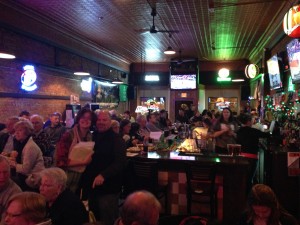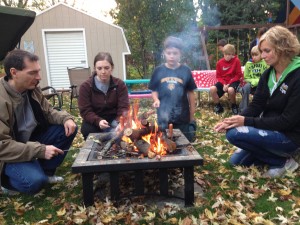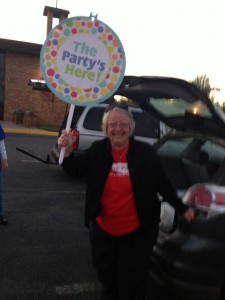John 2:13-25 January 19, 2014
 I was in Chicago this last summer to see Pearl Jam play at Wrigley Field. It was an incredible show, epic, as the kids might say. Now, I’m not much of a sports fan. I’m continually clarifying what team is for what sport and what city they’re from. I asked a few weeks ago who was in the Super Bowl, cuz I figured that was all said and done by this point. So, during the concert, Ernie Banks came out on stage with the band. I only learned later that when Ernie Banks came out onto the stage at Wrigley field that he had something to do with the game of baseball and the perennial underdogs, the Chicago Cubs. Anyway, he came out onto the stage and said, “welcome to my house.” And it was sort of lost on me, why he’d say that. I didn’t know who he was. And, after all, there were
I was in Chicago this last summer to see Pearl Jam play at Wrigley Field. It was an incredible show, epic, as the kids might say. Now, I’m not much of a sports fan. I’m continually clarifying what team is for what sport and what city they’re from. I asked a few weeks ago who was in the Super Bowl, cuz I figured that was all said and done by this point. So, during the concert, Ernie Banks came out on stage with the band. I only learned later that when Ernie Banks came out onto the stage at Wrigley field that he had something to do with the game of baseball and the perennial underdogs, the Chicago Cubs. Anyway, he came out onto the stage and said, “welcome to my house.” And it was sort of lost on me, why he’d say that. I didn’t know who he was. And, after all, there were 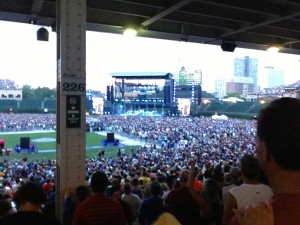 over 40,000 of us there, screaming and singing and generally trashing the place. And I was sort of like, well, who’s this guy? What gives him the authority to say that? His house?
over 40,000 of us there, screaming and singing and generally trashing the place. And I was sort of like, well, who’s this guy? What gives him the authority to say that? His house?
Today’s scripture is often interpreted that Jesus is upset about money or the economic system that surrounds the temple. But the language in John’s gospel suggests that about the authority of Jesus as God’s son. Jesus is stopping business as usual for the day to announce who he is, what he’s up to. He reminds all the people there just what the temple is for. He calls the temple, in his angry tirade, his Father’s house. And a house insinuates a home, doesn’t it? And that word, home, has deep and unlimited connotations.
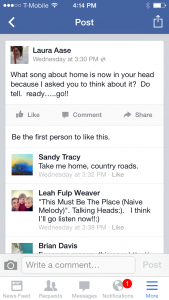 Just about 50 people responded to my Facebook query of “what song do you think of when you hear the word home?” The song suggestions ranged from the melancholy and wistful: John Denver’s, “hey it’s good to be back home again.” and “country roads, take me home, to the place, I belong…” and “She’s leaving home” by the Beatles to the joyful “Home, let me come home Home is wherever I’m with you” by Edward Sharp and the Magnetic Zeros and the delightful “This Must Be the Place” by the Talking Heads. Of course there was the down home southern goodness suggestion of “Sweet home Alabama…” and the old timey “O give me a home where the buffalo roam…” There’s a good, screamy Pearl Jam song called “Why go home” and the band Rancid got a shout out with “Journey to the End of East Bay.” Somewhere Over the Rainbow and What a Wonderful World, and Our House also got mentions, as did many others too numerous to name. It’s telling by just how many people responded what a chord the word “home” strikes with people.
Just about 50 people responded to my Facebook query of “what song do you think of when you hear the word home?” The song suggestions ranged from the melancholy and wistful: John Denver’s, “hey it’s good to be back home again.” and “country roads, take me home, to the place, I belong…” and “She’s leaving home” by the Beatles to the joyful “Home, let me come home Home is wherever I’m with you” by Edward Sharp and the Magnetic Zeros and the delightful “This Must Be the Place” by the Talking Heads. Of course there was the down home southern goodness suggestion of “Sweet home Alabama…” and the old timey “O give me a home where the buffalo roam…” There’s a good, screamy Pearl Jam song called “Why go home” and the band Rancid got a shout out with “Journey to the End of East Bay.” Somewhere Over the Rainbow and What a Wonderful World, and Our House also got mentions, as did many others too numerous to name. It’s telling by just how many people responded what a chord the word “home” strikes with people.
Whether they were lamenting or celebrating; whether it’s the sheer poetry of a song or the rapid-fire spitting of words – that word, that place all those feelings associated with home – well they’re all there, in those songs. Regret and joy; comfort and dis-ease; arriving, returning, leaving, celebrating, mourning. We all have our own experiences of home –of what that means, of how it feels, of how it can change. For some, home only digs up wounds, is a place to leave and never return. For others, home is a safe haven, a constant. Some of you have had numerous homes; some of you just a few.
So why was Jesus so mad? Well, because this was his Father’s house. This was where God resided. It’s where they literally believed God lived: in the temple. In the place called the “holy of holies.” While the temple was the central gathering place for a community where all kinds of things happened, its central purpose was to be God’s house, the place where God lived.
And Jesus was there to remind them of that, the sacredness of this home. He tells them who he is. He claims his authority as God’s son at the beginning of this book of John. (Matthew, Mark and Luke all tell this story at the end of their books.) And he uses this authority to point to God as his Father, to point to the temple, and then to point to his own body.
Perhaps, like me, the people were elbowing each other, saying “who is this guy?” It seems that perhaps people forgot why they went to the temple in the first place. Perhaps they never got around to worship after a full day of money changing and selling.
And so Jesus reminds them why they come to the temple in the first place. And he’s not singing John Denver. It may be more accurate to say he’s channeling one of the more angrier songs about home as he flips over tables, dumps out money, and uses a whip to get people’s attention. He then says something that must have made their ears ring: Jesus says, Destroy this temple, and in three days I will raise it up. Because they’d been working on rebuilding the temple for 46 years already and it wasn’t yet done. That just doesn’t make any sense! The writer of John helps to clear it up for us, giving us the insider scoop that he was talking about his own body and that even his disciples would only remember what that meant after Jesus had been crucified.
After all the shouting, the building didn’t matter. Jesus pointed to his body – seeming to say, this is home. God is not locked up in the temple. My body is the temple.
Which then points right to us, doesn’t it? After all, we claim to follow Jesus, right? We eat bread and drink wine, remembering the importance of Jesus’ body to transform our own lives. And we are a church, some would say, without a home. We don’t have “our own” building. Well, it’s Jesus who frees God from the confines of one holy space. It’s Jesus who releases God out into the scary, messy world of our lives. It’s Jesus who points to his own body and says, focus on this temple. This is life.
Watch video: http://www.theworkofthepeople.com/just-because
If following Jesus is about a way of life and not about a building, then we are well on our way folks. Jesus makes it clear that his Father’s house is not about a place, it’s about following a person. It’s about a way of life. And as we follow Jesus, we learn that we simply must be who God created us to be. We must be people who gather in whatever clothes we have to put on to come to worship. We must be people who ask the hard, embarrassing, doubtful questions about life and God. We must be a people who live in a way that shows what Jesus was pointing to – that our way of life is a home in and of itself.
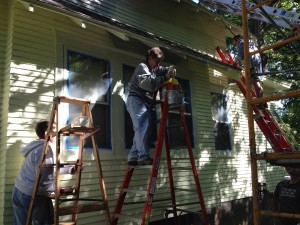 We live this way so that when people come to worship with us, no matter where we are, they will experience being loved and welcomed and accepted just because they are there.
We live this way so that when people come to worship with us, no matter where we are, they will experience being loved and welcomed and accepted just because they are there.
That is home, folks. No bricks and mortar. No street address. Body and blood that give us life, that transforms our lives.